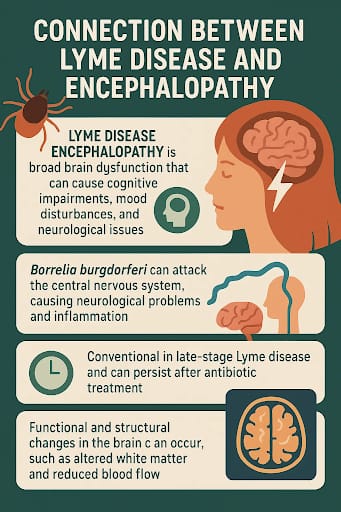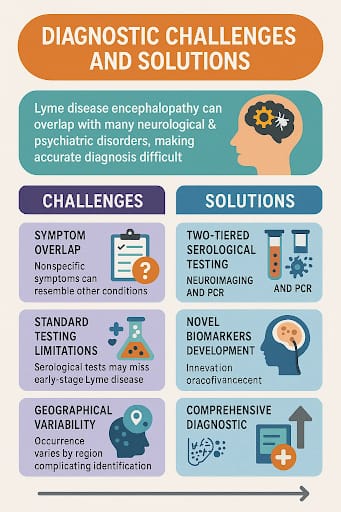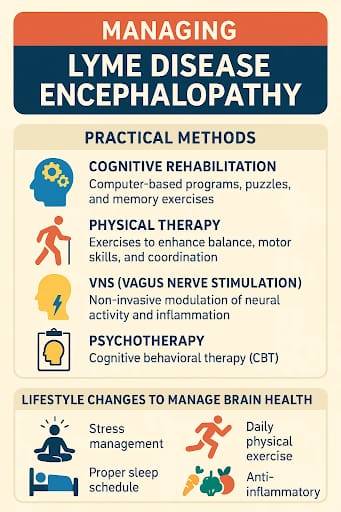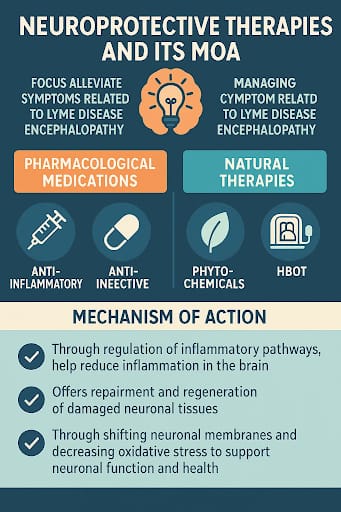
If you are suffering from Lyme disease, then you must be familiar with the sensation of brain fog where thinking clearly feels like wading away. This condition is not just disturbing but it’s a hallmark of Lyme disease encephalopathy.
This is a neurological chronic condition in Lyme disease which can severely affect cognitive function.
Reading this blog, we will understand the complexities of Lyme disease encephalopathy, its symptoms, diagnostic challenges, and options for treatment.
Even if you or your near ones are struggling with symptoms, exploring this aspect of Lyme disease is important for the journey of recovery.
Understanding Lyme Disease Encephalopathy
This condition is also referred to as neuroborreliosis, which is the neurological manifestation of Lyme disease through bacteria Borrelia burgdorferi. This condition happens when bacteria enters the CNS (Central Nervous System), resulting in inflammation, neurological and cognitive impairments.
If Lyme disease is not treated properly it has shown in the research that around 10-15% neuroborreliosis occurs in such cases.
Below are some signs & symptoms of Lyme disease encephalopathy:-
- Memory loss or disturbance
- Cognitive dysfunction as issues in problem solving and planning
- Brain fog affecting concentration and memory
So, understanding pathophysiology and observing these signs-symptoms are important for diagnosis and treatment at the right time.
What is the relation between Lyme Disease and Encephalopathy

In case of Lyme disease, the most common yet frequently ignored aspect is its major effect on the brain, leading to Lyme disease encephalopathy.
- So here, encephalopathy means a broad range of brain dysfunction that can cause cognitive impairments, disturbing mood, and neurological issues.
- Lyme disease arises when the bacteria Borrelia burgdorferi enter the CNS (Central Nervous System), leading to neurological problems and inflammation in the system.
- Also this is conventional in the later stages of Lyme disease and persists post antibiotic treatments.
As per research, Lyme disease can cause functional and structural changes in the brain.
For instance, neuroimaging has shown alteration in the white matter and reduction in cerebral blood flow in patients which correlate with cognitive impairments.
Diagnostic Challenges and Solutions in Lyme disease Encephalopathy

Lyme disease encephalopathy can manifest symptoms like memory issues, cognitive dysfunction, and brain fog which can overflap with many neurological and psychiatric disorders, which result in difficulty in accurate diagnosis output.
Challenges:-
- Symptoms overflap – Lyme disease encephalopathy symptoms are not specific and can resemble other medical conditions like chronic fatigue syndrome or psychiatric disorders which causes misdiagnosis.
- Standard testing boundary – Traditional diagnostic methods like serological tests may not be able to detect Lyme disease in its initial stage because in this stage antibody levels can be low or not present.
- Geographical changeability – Presence of Lyme disease varies by region to region, and in places where disease is not common, pathologists may be less likely to consider it in differential diagnosis, leading to complications in accurate observation.
Current and Advancement of Diagnostic Process:-
| Current Diagnostic Approach | Advancement & Future of Diagnostic Process |
| Two tiered serological test | Novel Biomarkers development |
| Cerebrospinal fluid analysis | Imaging Advancement |
| Neuroimaging and PCR test | Comprehensive Diagnostic |
Managing Lyme Disease Encephalopathy

Coping and managing requires a multifaceted approach which includes medical interventions, modification in lifestyle, and supportive therapies.
Practical Methods:-
- Cognitive Rehabilitation – Include computer based programs, puzzles, and memory exercises specialized to specific needs to improve memory, attention, and executive function.
- Physical Therapy – Tailored exercises to enhance balance, motor skills, and coordination to aim physical impairments caused by Lyme disease encephalopathy.
- VNS (Vagus Nerve Stimulation) – As per emerging research, non-invasive VNS may help to modulate neural activity and reduce inflammation to persistent Lyme related neurological symptoms.
- Physiological Method – Here in Lyme disease encephalopathy, CBT (Cognitive behavioral therapy) can help in coping with anxiety, depression, and mood disturbances.
Lifestyle Changes to manage Brain Health:-
- Stress management through meditation, and yoga exercises
- Quality and proper sleep schedule
- Daily physical exercise
- Anti-inflammatory diet to support brain health
Neuroprotective Therapies and its MOA

Neuroprotective therapies focus on alleviating potential symptoms associated with Lyme disease encephalopathy.
- Pharmacological medications for neuroprotection like – Anti-inflammatory, Anti-infective, and Nootropic agents are used to treat Lyme disease encephalopathy, only if it is recommended by healthcare experts to avoid any side effects.
- Natural therapies for neuroprotection such as – Phytochemicals and HBOT (Hyperbaric oxygen therapy) are used to manage Lyme disease related cognitive dysfunction.
Mechanism of Action:-
- Through regulation of inflammatory pathways, neuroprotective therapies help reduce inflammation in the brain.
- Offers repairment and regeneration of damaged neuronal tissues, to help in cognitive function recovery.
- Through shifting neuronal membranes and decreasing oxidative stress to support neuronal function and health.
Conclusion
- Lyme disease encephalopathy caused by Lyme disease that impacts cognitive function, resulting in memory loss or disturbance, brain fog, and emotional challenges.
- Lyme disease caused by bacteria Borrelia burgdorferi invades with CNS, resulting in inflammation.
- The diagnosis method is complex due to overlapping conditions of symptoms with other medical conditions but advancements in diagnostic testing are supporting patients.
- Treating and managing Lyme disease encephalopathy includes a mixture of treatments.
- Hence, with right guidance by healthcare experts and approach, symptoms can be managed and enhance quality of life for Lyme disease patients.
What's next to Explore?
Ready to explore a more complete path to recovery? Join the Lyme Support Network Community.
Reference
- Global Lyme Alliance. 2024. “Adjunct Therapies for Lyme Disease: HBOT (Hyperbaric Oxygen Therapy).” Globallymealliance.org. 2024. [GLA].
- Verma, Vivek, Matthew Roman, Disha Shah, Marina Zaretskaya, and Mohamed H. Yassin. 2014. “A Case of Chronic Progressive Lyme Encephalitis as a Manifestation of Late Lyme Neuroborreliosis.” Infectious Disease Reports 6 (4).
- Biniaz-Harris, Nicholas, Mara Kuvaldina, and Brian A Fallon. 2023. “Neuropsychiatric Lyme Disease and Vagus Nerve Stimulation.” Antibiotics 12 (9): 1347–47.
- Govil, Swati, Eugenio Capitle, Alexandra Lacqua, Reena Khianey, P.K Coyle, and Steven E Schutzer. 2023. “Common Neurologic Features of Lyme Disease That May Present to a Rheumatologist.” Pathogens 12 (4): 576–76. .
- Fallon, Brian A., John Keilp, Isak Prohovnik, Ronald Van Heertum, and J. John Mann. 2003. “Regional Cerebral Blood Flow and Cognitive Deficits in Chronic Lyme Disease.” The Journal of Neuropsychiatry and Clinical Neurosciences 15 (3): 326–32. https://doi.org/10.1176/jnp.15.3.326.
- Biniaz-Harris, Nicholas, Mara Kuvaldina, and Brian A Fallon. 2023. “Neuropsychiatric Lyme Disease and Vagus Nerve Stimulation.” Antibiotics 12 (9): 1347–47. https://doi.org/10.3390/antibiotics12091347.
- Goc, Anna, and Matthias Rath. 2016. “The Anti-Borreliae Efficacy of Phytochemicals and Micronutrients: An Update.” Therapeutic Advances in Infectious Disease 3 (3-4): 75–82.
- Garg, Kunal, Rachael Booth, Aiven Cobey, Leona Gilbert, and Aylin Ozdemir. 2025. “Diagnostic and Therapeutic Challenges in Lyme Disease and Co-Infections: Unraveling Neuropsychiatric and Neurological Complexities—a Comprehensive Case Series Analysis.” Integrative Medicine: A Clinician’s Journal 24.


